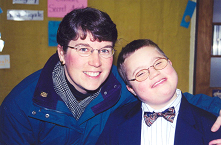American young people are, theoretically, fine with religious faith-but it does not concern them very much, and it is not durable enough to survive on after they graduate high school. One more thing: we’re responsible.
So begins Kenda Casey Dean’s book Almost Christian: What The Faith of Our Teenagers Is Telling The American Church (see the book review in this edition of Equip to Disciple). As one of the original researchers for the National Study of Youth and Religion and Associate Professor of Youth, Church and Culture at Princeton Seminary, Dean has been forced to come to the same conclusion that so many other researchers have come to: young people in our churches are not being discipled in a way that leads to active faith as adults. Here is another observation from Almost Christian: “Since the religious and spiritual choices of American teenagers echo with astonishing clarity, the religious and spiritual choices of the adults who love them, lackadaisical faith is not young people’s issues, but ours.” Let me add just one more pointed conclusion that comes from the National Study of Youth and Religion: teenagers mirror their parents’ religious faith…by and large parents get “what they are” religiously.
Download and read this entire issue of Equip to Disciple (Acrobat Reader Required).
Now those of us who hold to a covenantal theological framework for understanding God’s relationship with humanity are quite fond of pointing out the blessings for our children that come from God’s covenant promises to his people. Parents love that the promises and blessings extend from generation to generation. However, we tend to get a little squeamish when the topic of covenant “curses” comes up in relation to our faithfulness. After all to suggest that one’s lack of faithfulness might have generational implications is a pill that does not go down smoothly for many folks. So, in light of Dean’s findings, I would like to suggest another category for us to think about that lies somewhere between blessings and curses. I call this third category “generational consequences.”
 To use a biblical phrase from Galatians 6, the church is quite possibly now reaping what we have sown. On occasion, I will hear people say something along the lines of “this current generation of young people is more biblically illiterate than at any point in church history.” Let’s lay aside for a moment the difficulty of quantifying such a statement and for the sake of this article take it at face value. If the myriad of researchers who have concluded that young people imitate the religious faith and actions of adults who love them are right and if this current generation of young people is indeed biblically illiterate, then it does not take much of an intellectual leap to conclude that the generational consequence of adult actions in regards to knowing and applying scripture is being seen in our young people. I suppose this is actually a simple mathematical equation: A (adult religious actions) + B (youth emulate adult religious actions) = C (generational consequence: biblically illiterate youth who are abandoning the church).
To use a biblical phrase from Galatians 6, the church is quite possibly now reaping what we have sown. On occasion, I will hear people say something along the lines of “this current generation of young people is more biblically illiterate than at any point in church history.” Let’s lay aside for a moment the difficulty of quantifying such a statement and for the sake of this article take it at face value. If the myriad of researchers who have concluded that young people imitate the religious faith and actions of adults who love them are right and if this current generation of young people is indeed biblically illiterate, then it does not take much of an intellectual leap to conclude that the generational consequence of adult actions in regards to knowing and applying scripture is being seen in our young people. I suppose this is actually a simple mathematical equation: A (adult religious actions) + B (youth emulate adult religious actions) = C (generational consequence: biblically illiterate youth who are abandoning the church).
Thirty six years ago, Francis Schaeffer saw his generation moving from absolute truth, sound doctrinal positions, and biblical knowledge. With regularity he began exhorting the church to wake up to the potential outcomes of the slippery slope Christians were sliding down head first. One such occasion was The International Congress on World Evangelism in 1974 where Dr. Schaeffer presented a paper entitled Two Contents, Two Realities. This paper is now paired with his 25 Basic Bible Studies and published as a small book by Crossway. In Two Contents, Two Realities he warns “…if we have a latitudinarianism in religious cooperation, the next generation will have a latitudinarianism in doctrine, and specifically a weakness toward the Bible…We must have the courage to take a clear position.” Earlier in the paper, Schaeffer says that having strong doctrinal content is not enough by stating that “we must exhibit to our own children and to the watching world that we take truth seriously. It will not do in a relativistic age to say that we believe in the truth and fail to practice that truth in places where it may be observed…” It is disquieting that nearly four decades later many of the concerns of Dr. Schaeffer are coming to fruition. However, it would be egregious if the Church-the adults tasked with loving and raising the next generation-did not jump, holding tightly onto the next generation, from the sinking sand of biblical infidelity onto the solid foundation that is our only rule of faith and obedience; God’s Word.
The intention here is not to try to free young people from culpability for their apathy toward God’s Word by placing it totally on adults. Likewise, the intention is not to suggest that this generation of young people is hopeless. Instead, this should serve as a call to confession for being more akin to the “forefathers” spoken of in Psalm 78:8 who were a “stubborn and rebellious generation, whose hearts were not loyal to God, whose spirits were not loyal to him” more so than we are to King David in Psalm 71:17 who desired, even in old age, to proclaim the power of God to the next generation. It should also be a call for intercessors to plead with God on behalf of our youth that they are freed from the generational consequences of their forbearers’ actions. Finally, this is a rallying cry for adult disciplers to step forward to begin building this generation as “the generation of those who seek him, who seek your face, O God of Jacob (Psalm 24:6).” In my travels as Christian Education andPublications Youth and Family Ministries Consultant, the constant refrain that I hear from youth pastors, directors, and leaders across our denomination is “we need more adult leaders.” That statement is most commonly followed by this question: “why is it so hard to get adults to help with youth ministry?” While the answer to that question may be complicated, the generational consequence is straightforward…without adults to teach the scriptures and demonstrate faithful living to our youth, biblical illiteracy and church abandonment as young adults should come as no surprise to anyone.
I asked a group of adults recently who work with youth whether Bible teaching was the primary purpose of their church’s youth program or if the teaching was a part of the whole. In other words, do the programmatic aspects of youth ministry (games, singing, refreshments, etc…) exist to enhance the Bible teaching or is Bible teaching just one of many parts of the program? The length of debate following my question and the nature of the comments verified for me one of the secret fears that many of us who work with youth harbor: If Bible study is too deep, too frequent, or too long then youth won’t come. One of my concerns as it relates to this fear is that we not dumb down the scriptures in an attempt to make it more palatable, easily digestible, or relevant. If you work with youth in your church then you understand the tension here: if no youth come then there is no one to hear God’s word being taught but if they come and are bored then they won’t come back and then there will be no one to hear God’s word next week so I need to make sure to make Bible study short, funny, relevant and non-offensive. This is a classic youth ministry conundrum.
 Perhaps the best solution that I can give to this conundrum is anecdotal evidence from two youth groups. The first is from Safe Harbor Presbyterian in Stevensville, MD. When the youth director, Christian Graham, decided to make significant changes in the youth ministry moving from a more traditional youth program to one that revolved around a deeper Bible study in order to better foster Christian community, he did so with some trepidation. Not that he was going to stop the occasional games and other relational activities but Christian wanted to elevate the Bible study within the program. The first week a grand total of 2 students showed up. That would be fine if there were only 4 students in the youth group but this was a decrease of over 30 students. Perhaps teaching Romans verse by verse to teenagers was not the best idea for growing a youth group. However, within a month the group had grown again to over thirty students who each week eat homemade waffles and then feed on God’s word together. The second is about the youth group at Carriage Lane Presbyterian Church in Peachtree City, GA. Assistant Pastor of Youth, Brian Cosby, began feeling like his students were hindered in their study of the New Testament by not knowing Greek. So, he did what all the latest youth ministry books say to do for growing your youth group; he offered to teach a Greek class. Expecting 2 or 3 of his more academically minded youth to show up, Brian was shocked when fifty youth showed up to learn biblical Greek in order to be able to study scripture more fully. As with all anecdotal evidence, there are always instances that prove the opposite to be true as well. So, I cannot suggest that youth will show up in droves at your church if you start teaching God’s word in deeper ways. Yet, I am convinced that as adults who are charged with discipling our young people, we must begin teaching in a deeper, more satisfying manner and then demonstrating with our lives the transformational power of the Word.
Perhaps the best solution that I can give to this conundrum is anecdotal evidence from two youth groups. The first is from Safe Harbor Presbyterian in Stevensville, MD. When the youth director, Christian Graham, decided to make significant changes in the youth ministry moving from a more traditional youth program to one that revolved around a deeper Bible study in order to better foster Christian community, he did so with some trepidation. Not that he was going to stop the occasional games and other relational activities but Christian wanted to elevate the Bible study within the program. The first week a grand total of 2 students showed up. That would be fine if there were only 4 students in the youth group but this was a decrease of over 30 students. Perhaps teaching Romans verse by verse to teenagers was not the best idea for growing a youth group. However, within a month the group had grown again to over thirty students who each week eat homemade waffles and then feed on God’s word together. The second is about the youth group at Carriage Lane Presbyterian Church in Peachtree City, GA. Assistant Pastor of Youth, Brian Cosby, began feeling like his students were hindered in their study of the New Testament by not knowing Greek. So, he did what all the latest youth ministry books say to do for growing your youth group; he offered to teach a Greek class. Expecting 2 or 3 of his more academically minded youth to show up, Brian was shocked when fifty youth showed up to learn biblical Greek in order to be able to study scripture more fully. As with all anecdotal evidence, there are always instances that prove the opposite to be true as well. So, I cannot suggest that youth will show up in droves at your church if you start teaching God’s word in deeper ways. Yet, I am convinced that as adults who are charged with discipling our young people, we must begin teaching in a deeper, more satisfying manner and then demonstrating with our lives the transformational power of the Word.
I confess, I have utopian like intentions for this article. In the part of my brain that I reserve for imagining the big things that God is doing among the next generation, I am right now imagining that if you are an adult who is not currently involved with young people in your church that the Holy Spirit is starting to tickle your imagination about becoming a discipler of young people or becoming an intercessor in prayer on their behalf. I am also dreaming if you are already discipling youth that you are beginning to think about deeper, more satisfying ways to teach God’s Word. I do not want to be just a doom and gloom prognosticator because I am praying first and foremost that this current generation of youth will become known as the “revival” generation but I fear the generational consequences to the youth of 2040 if the church does not heed warning signs in 2010 and begin to send more adults into the battle for the souls of our young.

 We adopted our oldest son at age 17. He is a true DL. We soon learned that if we wanted him to stay within certain parameters, we had to draw the lines in closer knowing he would stretch them as far as he could. This is usually viewed as both a strength as well as a weakness. The strength of the DL is their ability to think with great creativity. While analytics will scrutinize everything and find few ways of doing things, the DL will list any number of ways to try something. The weakness of the DL is they need the analytic and common sense learners to work through the details in order for the project to work. If you want to motivate a DL, tell him that something is beyond his ability. In class, your best method of keeping this learner under control is to keep him close to you physically. The further he is from you the more likely he will be to be leading other students to try something a different way than you instructed.
We adopted our oldest son at age 17. He is a true DL. We soon learned that if we wanted him to stay within certain parameters, we had to draw the lines in closer knowing he would stretch them as far as he could. This is usually viewed as both a strength as well as a weakness. The strength of the DL is their ability to think with great creativity. While analytics will scrutinize everything and find few ways of doing things, the DL will list any number of ways to try something. The weakness of the DL is they need the analytic and common sense learners to work through the details in order for the project to work. If you want to motivate a DL, tell him that something is beyond his ability. In class, your best method of keeping this learner under control is to keep him close to you physically. The further he is from you the more likely he will be to be leading other students to try something a different way than you instructed. 
 Asking “Where can I find Steph Hubach” is kind of like asking “Where’s Waldo?” While Steph usually has a pretty busy speaking schedule in the fall, this year, she’s busy filming a 13-week DVD series on her book Same Lake, Different Boat for inclusion in the Gospel and Disability Educational Gift Packs. Grant funding from the Harris-Harper Family Foundation, matched by MNA, is providing the money for the creation of the video series itself. Replication and distribution will occur with Love Gift funds next year.
Asking “Where can I find Steph Hubach” is kind of like asking “Where’s Waldo?” While Steph usually has a pretty busy speaking schedule in the fall, this year, she’s busy filming a 13-week DVD series on her book Same Lake, Different Boat for inclusion in the Gospel and Disability Educational Gift Packs. Grant funding from the Harris-Harper Family Foundation, matched by MNA, is providing the money for the creation of the video series itself. Replication and distribution will occur with Love Gift funds next year.
